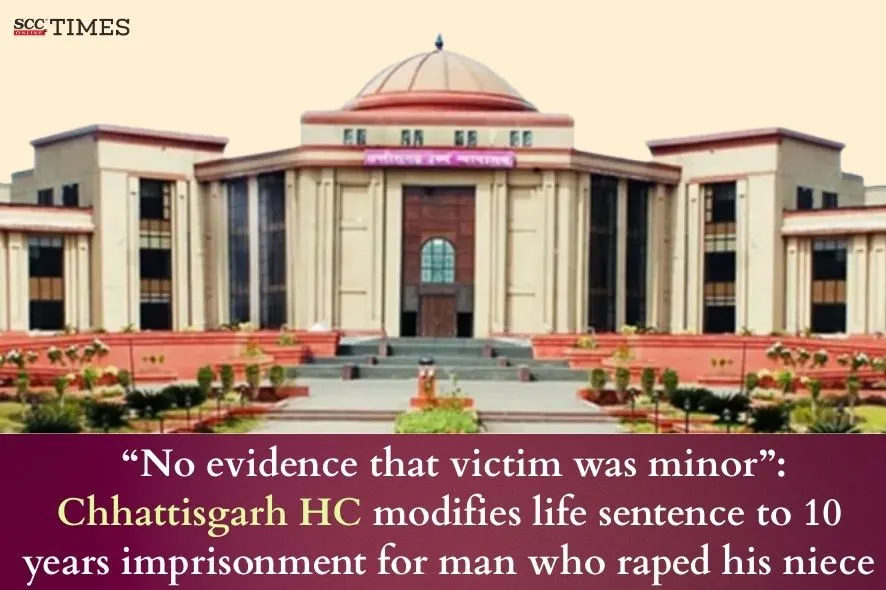Chhattisgarh High Court: In a criminal appeal filed by a man convicted of raping his niece, the Division Bench of Rajani Dubey* and Amitendra Kishore Prasad, JJ., partly allowed the appeal, holding that the prosecution had failed to prove that the victim was a minor on the date of the incident. Accordingly, the Court modified the conviction from Section 376 (3) to Section 376 (2) (f) of the Penal Code, 1860 (‘IPC’) and sentenced the convict to rigorous imprisonment for 10 years.
Background
In 2018, the victim was sleeping with her sister and father, when around 11:30 PM her father raped her. A few days later, when her paternal aunt came to find out about the incident, she took the victim and her sister to live with her. Thereafter, six months later, the convict, the victim’s paternal uncle, raped her when she was sleeping at their house. The victim informed her maternal aunt, who told the victim’s mother. The victim’s mother filed an FIR against the convict uncle.
Subsequently, the Trial Court convicted the uncle under Section 376 (3) of the IPC and sentenced him to undergo life imprisonment along with a fine of Rs 1 Lakh. Aggrieved, he filed the present appeal.
Issues and Analysis
1. Whether on the date of incident the prosecutrix was a minor?
The Court noted that the prosecution had mainly relied upon the school admission register, discharge register, and Class 1 marksheet. As per the admission register, the date of birth of the victim was 05-06-2005, and she was admitted to Class 1 on 16-06-2010. In the cross-examination, the Primary School Principal admitted that at the time of the victim’s admission, she was not posted in the school, and the endorsement regarding her date of birth in the said school register was not in her handwriting. The Court further noted that the victim stated that she was about 14 years old and her birth year was 2005. While the victim’s mother reiterated the aforesaid birth date, she did not depose her basis for claiming the said birth date.
Noting the aforesaid, the Court stated that, from the evidence, it appeared that only the school admission and discharge register were available in support of the victim’s date of birth.
While relying on Sunder Lal v. State of Chhattisgarh1, the Court held that there was no clinching and legally admissible evidence presented by the prosecution to prove that the victim was a minor on the date of the incident. Despite this, the Trial Court held her to be a minor in the impugned judgment. Hence, the Court set aside the finding recorded by the Trial Court that on the date of the incident, the victim was below 16 or 18 years of age.
2. Whether the convict committed forcible intercourse upon the victim?
The Court noted that the victim had reiterated the prosecution’s story and admitted her signature on the FIR and her statement recorded under Section 164 of the Code of Criminal Procedure, 1973 (‘CrPC’). She stayed firm that the convict raped her during cross-examination as well. The Court further noted that the same facts were corroborated by the victim’s maternal aunt and sister. The maternal aunt further stated that upon getting information, she, along with her father, her sister, and the victim, lodged the report.
The Court further noted that, as per the doctor who examined the victim, the hymen was found to be recently ruptured and was in the position of 5 O’clock. She also had redness, but no bleeding. She denied the contention that the hymen can rupture by playing or riding a bicycle.
Regarding the five-day delay in lodging the FIR, the Court noted that it was clear from the statements of the victim, her mother, and maternal aunt that her parents were separated. In her statement, the victim stated that firstly her father committed forcible sexual intercourse with her, and after some time, when she was sleeping at her paternal aunt’s house, the convict, who was her paternal uncle, committed forcible sexual intercourse with her. When she informed her paternal aunt about the same, she did not report the matter against the convict, her husband. Thereafter, she informed her sister and her maternal aunt, who told the victim’s mother. Subsequently, they went to the police station and lodged the FIR.
The Court further noted that before the Trial Court as well, the victim deposed against the convict and remained firm that the convict had committed forcible sexual intercourse with her. Furthermore, since the hymen was found to be ruptured, the medical report also supported the prosecution’s case. Thus, the Court held that the prosecution had proved the fact that the convict had raped the victim.
Decision
Given the aforesaid, the Court held that the prosecution had failed to prove that on the day of the incident, the victim was a minor so the offences under Section 376 (3) of the IPC and Section 6 of Protection of Children from Sexual Harassment Act, 2012 (‘POCSO’) was not made out against the convict and only the offence under Section 376 (2) (f) of the IPC was made out against him.
Thus, the Court modified the conviction from Section 376 (3) to Section 376 (2) (f) of the IPC and sentenced the convict to rigorous imprisonment for 10 years, including the period of detention already served by him.
Accordingly, the appeal was partly allowed.
[A v. State of Chhattisgarh, 2025 SCC OnLine Chh 8326, decided on 22-08-2025]
*Judgment decided by: Justice Rajani Dubey
Advocates who appeared in this case:
For the appellant: Rohit Sharma
For the respondent: M. Asha, PL
Buy Penal Code, 1860 HERE
Buy Protection of Children from Sexual Offences Act, 2012 HERE
Buy Code of Criminal Procedure, 1973 HERE
1. CRA No. 352/2024





